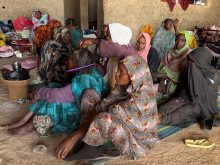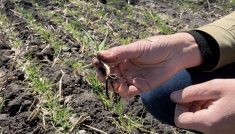A new five-year $125-million funding agreement signed between the Canadian Foodgrains Bank (CFB) and the federal government means the Canadian food aid program will continue its quick and early response to global food crisis.
Minister of International Co-operation Beverly Oda announced October 26 that Ottawa will provide the CFB, a partnership of 15 churches and agencies, with $25 million a year in matching funds to continue its food assistance work.
The agreement reflects an ongoing commitment by government to fund the CFB at what s been an increased level of funding received in recent years, said CFB executive director Jim Cornelius. The CFB received an additional $9 million over the past four years to be able to respond more effectively to various global emergency food crisis.
Read Also

Horse live export ban on back burner
Animal welfare groups still hope Canada’s Parliament will ban the export of live horses for slaughter, a topic back in the news due to a recent court case in Manitoba.
This is a continuation of our current agreement at the same level of funding and we re very pleased with that, said Cornelius.
Our member agencies, global partners, and supporters across the country are deeply appreciative of this continued support.
The funding enables a response timed to emerging needs, before events become crisis and make headlines, he said.
By having money in the bank, as we like to think of it, we re able to move very quickly, before something gets into the news, said Cornelius. We don t have to go out and make an appeal, or to put together a proposal. The funds are there ready for us to respond quickly when and as needed.
For example, the CFB was providing support to those affected by the accelerating drought-related food crisis in East Africa months before media began reporting about it, thanks to agency partner updates about problems brought on by scant or no rainfall and the looming spectre of failed crops.
Likewise, if something happens quickly such as flooding that hit Pakistan, they can get in early and don t have to make emergency public appeals first, said Cornelius.
An estimated 16,000 persons whose farms and livelihoods were devastated in Pakistan have been helped with food assistance by the CFB.
The CFB has committed to 64 projects in 26 countries worth $21 million, including $8.8 million for those affected by the drought in East Africa.
Cornelius said they do expect much of their resources over the next five years to be put toward emergencies.
Much of it will be used to respond to food crisis over the next five years.
The flexibility of this agreement allows for the CFB to do ongoing work where needed, however, including for ongoing projects such as those in Ethiopia, Somalia and Kenya where, through building micro-sand dams they can help drought-proof regions and build up communities resilience.
In 2010 the Canada Foodgrains Bank provided $38 million of assistance for 2.3 million people in 35 countries. Since its founding in 1983, the CFB has provided over $500 million of assistance for people in 80 countries, including 1.1 million tonnes of food assistance.
———
We don t have to go out and make an appeal, or to put together a proposal. The funds are there ready for us to respond quickly when and as needed.
JIM CORNELIUS
Executive director Canadian Foodgrains Bank

















